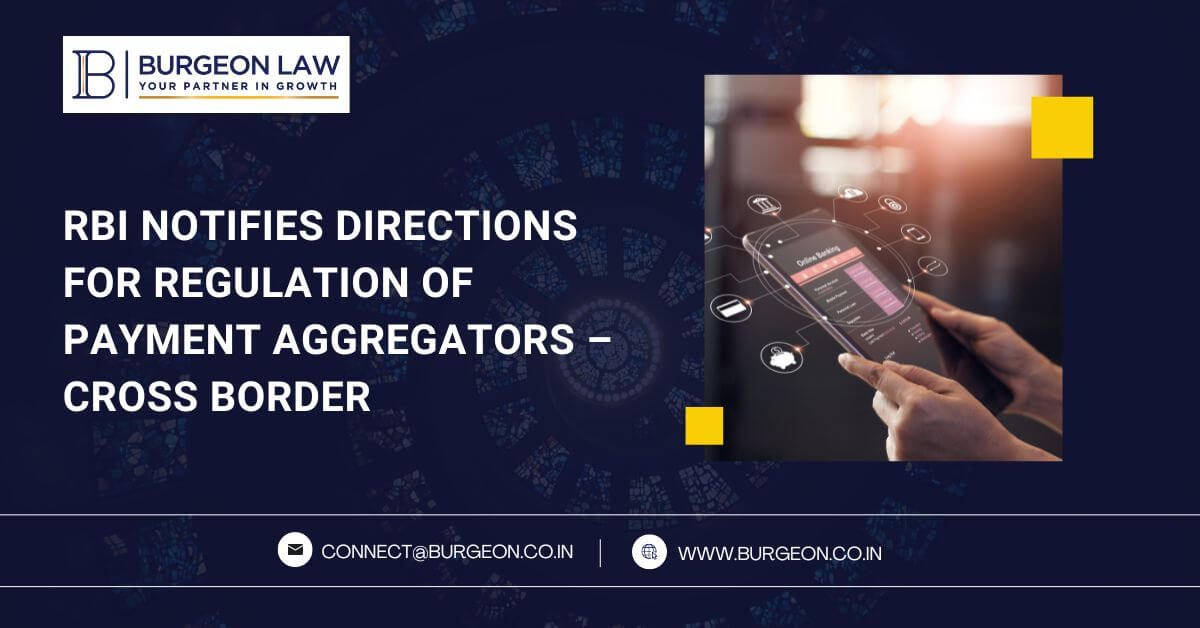Delineating The Difference Between A Payment Aggregator – Cross Border And An Online Payment Gateway Service Provider
On October 31, 2023, the Reserve Bank of India (RBI) through its circular named Regulation of Payment Aggregator – Cross Border; (the Regulations), has brought all entities involved in facilitating cross-border payments for the import and export of goods and services in online mode (erstwhile “OPGSP”), including payment aggregators indulged in cross border transactions (PA-CB), under its direct regulation.
The regulation marks a departure from the existing regulatory framework wherein entities that had obtained registration with an ‘Authorised Dealer Category – I’ bank (AD Bank) as an OSGSP were governed under the RBI circular dated: 24 September 2015, on ‘Processing and settlement of import and export related payments facilitated by Online Payment Gateway Service Providers’, but were not under the direct supervision of RBI, with the AD Banks tasked with the responsibility to ensure OSGSP’s compliance with the guidelines.
Under the new Regulations, all non-bank entities engaged in PA-CB services would be required to apply for authorization from the RBI by April 30, 2024, entailing the category of PA – CB activity they are engaged in. These include: (a) export only PA – CB, (b) import only PA – CB; and (c) export and import PA – CB.
Additionally, such non-bank payment aggregators currently involved in PA-CB activities must notify the RBI of their intention to persist with these activities within 60 days from the date of the Regulations, before seeking approval from the RBI for such activities. However, AD Banks are not obligated to obtain separate approval from the RBI for engaging in PA – CB activities.
Key Requirements under the Regulations
FIU-IND Registration
FIU-NID, the Financial Intelligence Unit — India, is the agency tasked with handling information pertaining to financial transactions and aiding intelligence, Investigation, and enforcement agencies in their global endeavours to combat money laundering and the financing of terrorism. PA — CBs would have to ensure registration with the agency before applying for its authorization from the RBI, therefore ensuring active compliance with the provisions of the Prevention of Money Laundering Act, 2002 (“PMLA”).
Net worth requirement
All PA — CBs applying for an authorization before the RBI shall have a minimum net worth of INR 15,00,00,000 (Indian Rupees Fifteen Crores) at the time of submitting the application.
Subsequently, the said net worth requirements are required to be increased up to a minimum of INR 25,00,00,000 (Indian Rupees Twenty-Five Crores) by March 31. 2026, for existing PA — CBs and by the third subsequent financial year from the date of RBI authorization for new PA — CBs
Transaction limit
PA-CBs are now allowed to facilitate payments for individual import or export transactions, with a maximum limit of INR 25,00,000 (Indian Rupees Twenty-Five Lakh) per unit of goods and services. which is a significant increase from the earlier transaction limits set for OPGSPs i.e. US$ 2.000. {United States Dollar Two Thousand) for each import transaction, and US$ 10,000 (United States Dollar Ten Thousand) for each export transaction.
Merchant Due Diligence
PA — CBs are required to conduct due diligence of all Indian and foreign merchants, Indian and foreign e-commerce marketplaces and payment aggregators before providing its services, in line with the “Master Direction — Know Your Customer (KYC) Direction. 2016″ issued by the RBI on 25 February 2016.
Additionally, for import transactions, PA-CBs are required to carry out due diligence on buyers who import goods or services exceeding INR 2,50,000 (Indian Rupees Two Lakh Fifty Thousand) per unit.
The RBI has further emphasised that it is the responsibility of PA-CBs to ensure that they do not facilitate any payments for import/export transactions involving goods/services that are restricted or prohibited under India’s foreign trade policy (FTP).
Fund flow for import transactions
Entities operating as import-only PA-CBs must establish and maintain an Import Collection Account (ICA) with an AD Bank. Payments received from customers for import transactions should first be deposited into an escrow account of the domestic payment aggregator. Subsequently, the funds must be transferred to the ICA for further settlement with the offshore merchants.
Payment system for import transactions
Small-PPIs (prepaid payment instruments) are excluded as a payment instrument while facilitating import transactions. PA — CBs are allowed to use any authorised payment system other than small PPIs, in India for facilitating transaction.
Fund flow for export transactions
Entities operating as an export-only PA – CB are required to hold an Export Collection Account (“ECA”) with an AD Bank in which export proceeds are to be credited. Tins account can be in either Indian Rupees or a foreign currency, necessitating the maintenance of separate currency accounts if foreign currency is chosen. An export PA-CB can process settlements for Indian merchants in foreign currencies only if the said merchants are directly onboarded by them.
Additional Compliances
PA-CBs must adhere to the guidelines pertaining to governance. merchant onboarding, customer grievance resolution, and dispute resolution framework.
They are also required to follow baseline technology recommendations and comply with security, fraud prevention. And risk management frameworks as outlined in the Guidelines on Regulation of Payment Aggregators and Payment Gateways for domestic transactions.
These requirements must be met and satisfied by the PA-CBs by January 31, 2024
Conclusion
The RBI’s cross-border payment regulations marks a significant milestone as it eases key constraints, like transaction limits and operational obstacles via AD Banks, and mandates licensing as PA-CBs. RBI now directly oversees PA-CBs through its Department of Payment and Settlement Systems (“DPSS”), imposing substantial compliance responsibilities.
Further, RBI stresses the importance of robust onboarding, grievance redressal, anti- money laundering, and information security measures for payment facilitators. This framework streamlines permitted trade payments for all involved parties, ensuring efficiency and regulatory compliance. Thus, adhering to and comprehending these Regulations is imperative for entities engaged in cross- border payment facilitation to ensure effective compliance for smooth operation within the RBI’s regulatory framework.

